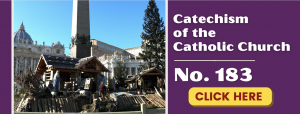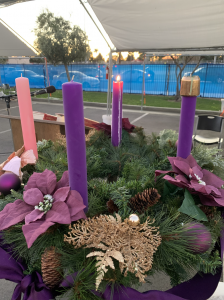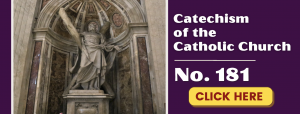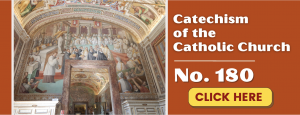Memorial of Saint Francis Xavier, Priest




“For greater things you were born.” (Ven. Mother Luisita)
THURSDAY, DECEMBER 3RD Mt. 7: 21, 24-27 “Not everyone who says to me, ‘Lord, Lord,’ will enter the kingdom of heaven, but only the one who does the will of my Father in heaven. Everyone who listens to these words of mine and acts on them will be like a wise man who built his house on rock. The rain fell, the floods came, and the winds blew and buffeted the house. But it did not collapse; it had been set solidly on rock.”
- Today, Jesus presents us with the wise man who built his house solidly on rock and survived the floods. We are preparing for the coming of Our Lord and Savior Jesus, born of Mary, with Saint Joseph as his foster father. The Holy Family is our role model for building healthy, holy and happy families on the solid rock of virtue!
- Today, let us meditate on Saint Joseph as a role model for fathers in the family. Later, we will meditate on the Blessed Virgin Mary as a role model for mothers in the family. Even if we cannot reach their perfection, we can beg good Saint Joseph and our Blessed Mother Mary for the grace, and strive to imitate them a little more each day. For the glory of God and the sanctification of ourselves and our families!
- “There are many saints to whom God has given the power to assist us in the necessities of life, but the power given to Saint Joseph is unlimited: It extends to all our needs, and all those who invoke him with confidence are sure to be heard.” Saint Thomas Aquinas
GLORIOUS SAINT JOSEPH, OUR SUBLIME MODEL by Fr. Ed Broom, OMV
If we want to look to the saints as models then we should raise our eyes, mind and heart to the greatest of all saints and that is of course GLORIOUS SAINT JOSEPH! The Church celebrates Liturgically Glorious Saint Joseph twice a year: March 19st and May 1st. In March, he is celebrated under the title Saint Joseph, Husband of Mary. In May, his title is Saint Joseph the Worker.
In this short essay, we would like to focus on Glorious Saint Joseph as Patron of Families and Patron of Fathers. As we all know, in the world in which we live the family is definitely in crisis, as well as fatherhood. For these two reasons we would like to raise our minds and hearts to Saint Joseph to pray for families, as well as to serve as a splendid and shining model for fathers to follow.
One of the titles given to Saint Joseph in the beautiful prayer that we call the Litany of Saint Joseph is the poetic expression Saint Joseph, Ornament of the Domestic Life, pray for us. What do we mean by the word ornament? Very simply, an ornament has as its nature and purpose to adorn, to beautify, to dignify, to make noble. If Saint Joseph is given a more prominent role in the family, then families indeed will become more beautiful, more noble, more loving, more pure, more elegant, more humble, more dignified, more respectful—in a word, more holy!
Therefore, we encourage all families to invite the Glorious Saint Joseph to be a living member of your family, of course in union with Mary, the Spouse of Saint Joseph, and Jesus, our Lord, Savior and God. Two suggestions on how to invite Saint Joseph to have a more prominent presence and role in the sanctification of your family. First, purchase either an attractive statue of Saint Joseph and place it in a prominent place, or you might prefer to purchase an attractive painting of this great saint. Next, on a daily basis, have the family pray together a prayer to Saint Joseph; it might even be the Litany of Saint Joseph. Do not be surprised to experience real changes improving your family life in a short time if this is done. The great Saint Teresa of Avila, woman Doctor of the Church, who loved and promoted devotion to Glorious Saint Joseph commented that sometimes saints delay in their intercession. But not so with Saint Joseph, he works quickly! She said that he is the saint to beg for graces in all circumstances and situations.
Now let us move on to another dimension of the personality of the Great and Glorious Saint Joseph and that is with respect to his Paternity—or if you like, Saint Joseph in his role as father.
The Church actually gives Saint Joseph a theological category that places him in the apex or zenith of all of the saints and this is called Protodulia. By this title, we mean that Saint Joseph as saint is the first to be venerated among all the saints. Saint Bernardine of Siena and other saints give the reason and it is because of the dignity of his office or the dignity of his sublime vocation. For according to the vocation that God gives to any individual, He will always give corresponding graces commensurate with that vocation. The Sacrament of Marriage enables a husband and wife to be faithful to each other, and to be responsible and holy parents. Holy Orders enables the priest to carry out his priestly duties with grace, order, love, and perfection. Likewise, God called the great Saint Joseph to be both Spouse of Mary, the Mother of God, as well as to be the earthly father to Jesus, the Savior of the world. Therefore, it stands to reason, that due to these two sublime duties, Saint Joseph would be endowed with a super abundance of graces. For this reason, we want to love Saint Joseph, pray to Saint Joseph, and trust in the power of his intercession.
Saint Joseph as Father! One of the most astounding and mind-boggling works of the Eternal Father was to send His Only Son Jesus, the Second Person of the Blessed Trinity, and allow His Son to become a little Baby—vulnerable, weak, and totally dependent upon a human mother and a human father—Mary and Saint Joseph. Indeed, Saint Joseph was and always will be the earthly father of Jesus! This was the will of the eternal Father for all eternity. And of course, Saint Joseph was the best of all earthly fathers. We would like to highlight only a few sublime qualities of Saint Joseph as father so that it will serve as a springboard for many fathers to imitate. We all desperately need good role models to imitate, and now, more than ever, fathers need a role model, and Saint Joseph is by far the best!
The following are five specific qualities that Saint Joseph lived as father to Jesus and as a model of all present and future fathers. May Glorious Saint Joseph intercede for fathers that they will faithfully carry out the sublime role that God has entrusted to them.
FIRST, Saint Joseph was a faithful son of the Eternal Father. What is meant by this is simply the following: to be a good father, one must first and foremost be a noble, loving, and obedient son to the heavenly Father. All fathers must pray with utmost sincerity the prayer of the Lord: “Our Father, who art in heaven hallowed be thy name….” A true father must have God as his guide, source, life, and inspiration. May fathers, in imitation of Saint Joseph, cultivate a deep relationship with the heavenly Father, and learn the true meaning of the Lord’s Prayer, The Our Father.
SECOND, Saint Joseph was a faithful and loving spouse. The Liturgy highlights how Saint Joseph cherished his wife, the Blessed Virgin Mary. The word cherish means that he really loved her. It is true that both Saint Joseph and Mary decided upon and lived faithfully a virginal marriage, under the inspiration and guidance of the Holy Spirit. Nonetheless, on a human level there existed a most profound and dynamic love that bound them together, a love imbued with the presence of the Holy Spirit. Therefore, to be true and genuine fathers, husbands must love God, but then they must really love their wives. For when they love their wives, this love overflows and descends upon their children, like rainfall that falls and moistens the parched ground. A gesture of kindness and love given to his wife, is a gesture of kindness and love given to their children!
THIRD, good Saint Joseph was a teacher. He taught Jesus, on a human level, many important practices. He taught Jesus how to speak and say Abba—Daddy! He taught Jesus how to walk. He taught Jesus the art of craftsman as a carpenter. Now listen to this: Saint Joseph even taught Jesus how to pray! The words of the Psalms, such as “The Lord is my Shepherd, there is nothing I shall want….” (Psalm 23:1), Saint Joseph prayed these words and taught the Child Jesus to pray them. How sublime! The great Saint Joseph taught the Logos, the Eternal Word of God the Father, how to pray using human words! The documents of Vatican II and the Catechism of the Catholic Church insist on the fact that the parents—both father and mother—are the primary teachers of their children, most especially in that which refers to the faith. May good Saint Joseph as a most splendid model, inspire fathers to truly be the first and best teachers of their children in all areas: academic, social, human, emotional, but especially as teachers of morality, spirituality, and all that refers to the good of the soul of the child and their eternal salvation!
FOURTH, Saint Joseph was PRESENT to his child and to his wife. What we mean by present refers to the all-pervasive sad fact that so many fathers today actually become what we might term Drop-out Dads! This term Drop-out Dad has a multiplicity of interpretations, all nefarious and noxious to the well-being of the child and the family at large. Here are a few: divorcees, those involved in adultery, those hooked to vices (drinking, porn, drugs, casino gambling or the horses), those who are physically present but emotionally disengaged or disconnected. We invite all to seek out the song Cat’s in the Cradle by artist Harry Chapin, and especially pay attention to the lyrics. In sum, the father is just too busy to be involved in the life and activities of his son and he never really gets to know his son. This indeed becomes a vicious cycle passed on from one generation to the next. Contrariwise, good Saint Joseph was always, and we emphasize always, available to the needs of his family—both wife and Son! Saint Joseph prayed with the family, worked with the family, ate with the family, went to the Synagogue and Temple with the family, laughed with the family, relaxed with the family, and finally died in the arms of those he loved most—Jesus and Mary!
FIFTH, a very important final note on the noble, sublime, and holy presence and person of the great Saint Joseph was his willingness to sacrifice himself and suffer for Jesus and Mary, not in one isolated case but many times, and intense sufferings! Saint Joseph suffered due to the Virginal Conception of Jesus in the womb of Mary, until the angel cleared his doubt, and Saint Joseph took Mary to be his spouse. Saint Joseph made the long and grueling trip from Nazareth to Bethlehem, in total obedience to the governing authorities, accompanying his pregnant wife on a donkey those many miles. Upon arriving, Saint Joseph received nothing but rejection: “There was no place for them in the Inn.” (Lk. 2:7) Then Saint Joseph had a dream that the wicked King Herod wanted to kill his Son. In the bitter cold and darkness of night, faithful, strong, and obedient husband and father, good Saint Joseph, fled with his family to Egypt, thereby saving Jesus from being slaughtered to death!
The strong, valiant, courageous, and trusting Saint Joseph experienced all these episodes and more, motivated by a most profound love for his family—his wife and his Child – the Christ Child! True and authentic fathers must have a compelling need to look up to the valiant and courageous Saint Joseph as model and guide. In other words, true fathers must be willing to work hard for their children, sacrifice for their children, and even be willing to SUFFER for their children, and sometimes suffer painfully for their children to bring them to safety from the many wiles of the modern Herods! Our human nature shirks and recoils from the prospect of suffering. However, it is part and parcel of human existence. Saint Joseph sacrificed himself and suffered intensely for one reason: LOVE! This great saint loved God; he loved his wife Mary, and he had an all-encompassing love for his Son, the Lord Jesus Christ, the Son of the living God. May our modern fathers, our modern Dads, lift up their eyes to good Saint Joseph and beg for his heavenly intercession, especially in moments of trial when pain and sacrifice are demanded. No doubt, good Saint Joseph will be present, powerful, and providential in his assistance!
In conclusion, we would like to make this closing comment. The first so to speak devotees (those truly devoted to) this great and glorious Saint Joseph were both Our Lady and Jesus, the Lord. For all of us to have an integral, well-balanced, and complete relationship with Jesus and Mary, then we must also have a great love for glorious Saint Joseph. So we would like to end with a prayer to Jesus, Mary and Saint Joseph:
Jesus, Mary and Joseph, I give you my heart and my soul;
Jesus, Mary and Joseph, make my heart like unto yours;
Jesus, Mary and Joseph, assist me in my last agony;
Jesus, Mary and Joseph, I breathe forth my soul unto thee.
O Sacrament most holy, O Sacrament Divine,
all praise and all thanksgiving be every moment thine.
Copyright 2020 Oblates of the Virgin Mary
St. Peter Chanel Church, Hawaiian Gardens, CA














